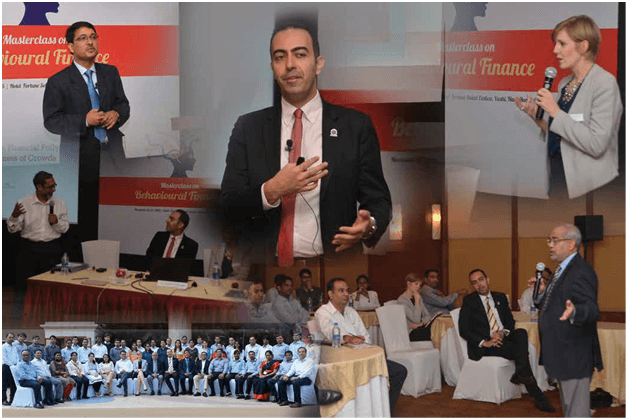Masterclass on Behavioural Finance
November 26-27, 2015
Hotel Fortune Select Exotica, Navi Mumbai

NISM has organised a Masterclass on Behavioural Finance during November 26-27, 2015 at Hotel Fortune Select Exotica, Vashi, Navi Mumbai.
The Master Trainer of the programme was Dr. Arman Eshraghi, a lecturer in Finance and Accounting and Director of MSc Finance and Investment at the University of Edinburgh and a fellow of the Higher Education Academy. He is BE and MBA from Sharif University and PhD in Finance from the University of Edinburgh.
The key objective of the masterclass was to explore the nuances of decision making in the presence of risk and uncertainty with useful insights into the behavioural of both individual investors and finance professionals. Significant focus was placed on practical applications for executives in charge of managing assets and investment client portfolios.
The areas covered in the programme were as under:
1. Introduction to Behavioural Finance
2. Practical insights from the latest academic evidence
3. Various types of cognitive biases and their investment implications
4. Discussion on prospect theory
5. Market Efficiency v/s Market Anomalies
6. Neuroscience and Finance
7. Sociology and Finance
8. Use of Behavioural Finance in Portfolio Management
The participants for the programme were from different institutions like SEBI,NSE, BSE, Reliance Capital Asset Management Ltd., ICICI Securities, Axis Mutual Fund, HDFC AMC, Bank of India, Morgan Stanley and NISM.
The programme was inaugurated by Mr. Sandip Ghose, Director, NISM. He has discussed in detail about the importance and necessity of training and knowledge upgradation for officials working in financial markets.
Mr. Jitendra Kumar, Member of Faculty, SRSS was the in-charge of the programme. He has apprised to the participant about the role and function of School for Regulatory Studies and Supervision (SRSS) and future programmes of SRSS.
The valedictory address was delivered by Mr. Bazil Shaikh, Former Principal CGM, RBI. He has also discussed on impact of financial crisis and policy response towards that.

